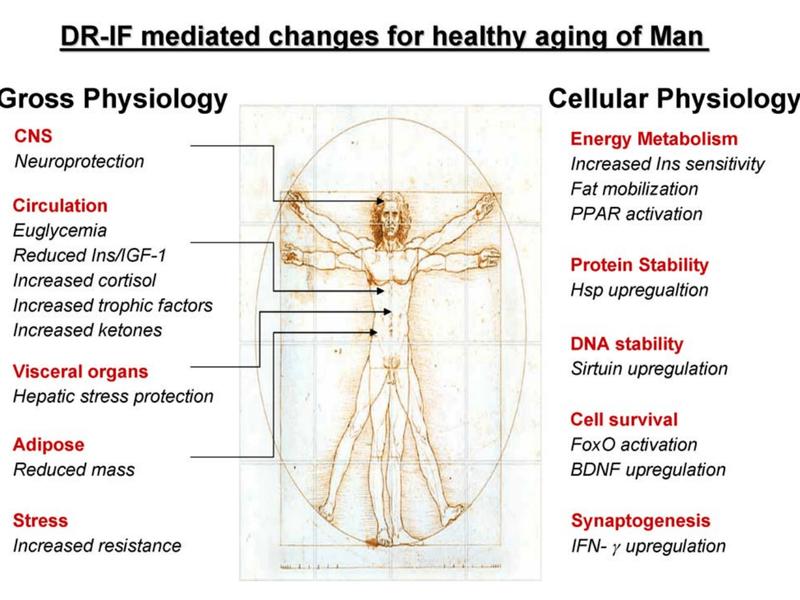Intermittent fasting is the practice of fasting (not eating) intermittently (in periods/blocks). In practice this means you set aside certain days or parts of days regularly in which you do not eat.
Personally I don't eat 16 hours a day, and then do allow myself to eat the remaining 8.
The health benefits of intermittent fasting
The benefits of IF have mostly been researched in animals, and in shorter terms in humans. My personal favorites:
- Longevity (longer life)
- Better health both in the short and long term
- Better focus during the day
- No need to worry about food during the day (if you have a specific diet)
For the bio geeks:
- Neuroprotective effects and stimulated synaptogenesis
- Better response to insulin
- Hepatic stress protection
- Energy metabolism benefits (PPAR, Insulin sensitivity)
- Sirtuin upregulation
- FoxO and BDNF upregulation
- See featured image for full overview, and this link for original research
My research and experience
This is the first time I make a video for this kind of thing. Let me know what you think of it so I can improve!
Short term intermittent fasting health benefits
During times where you do not eat, your body changes its metabolism. This includes:
- Burning less carbohydrates (glycogen)
- Burning more fats (through lipolysis)
The research on how IF induced metabolic changes influence humans is sparse. Personally I notice that I:
- Can focus better
- Feel lighter, both mentally and physically
- Can do sports perfectly fine
On the last note of sports, I've literally gone on full day hikes and lifted weights during the day. Both of them during my fasting window.
Why does it work?
The body has a number of defense and compensation mechanisms to deal with all sorts of things. This includes for example poisons, exercise, sunlight and so on.
These mechanisms stay dormant until they are needed. Intermittent fasting activates them to increase your health.
Nobody can ever say why the body does what it does, but an evolutionary perspective makes sense.
Let's say you are a caveman and you can't find food. Your body could do 2 things:
- Change nothing and just keep growing weaker
- Increase fitness to increase the odds of finding food and/or hunting successfully
The one that makes most sense is 2.
I'm not saying this is the reason the body has this mechanism, but it is a fun way of looking at it.
How to do intermittent fasting
There are many variants. Personally I'm a fan of the "8 hour window" type. Basically you take a period (a consistent period) each day where you allow yourself to eat. For the rest you do not eat or drink anything that spikes your blood sugar.
So no:
- Sugar or milk in your coffee/tea
- Fruit juice (this is not about vitamins or being "healthy", we are fasting)
- Foods of any kind
- If you doubt it, don;t take it
What's ok:
- Unsweetened tea
- Unsweetened coffee
- Water
The rule I stick to is: Eat or drink nothing other than coffee, tea and water.
And I rarely even drink coffee...
When you do start eating...
Make sure you planned your food. If you have limited discipline you will start eating unhealthy stuff.
The intermittent fasting health benefits will not protect you from eating shit food. Maybe they buffer a little, but if that is what you are after, get your priorities straight.
